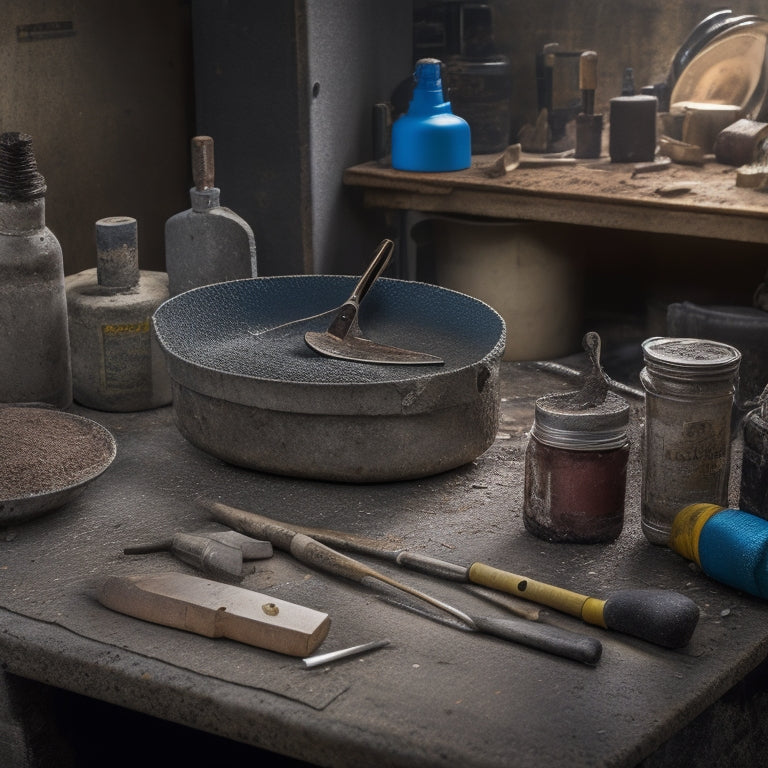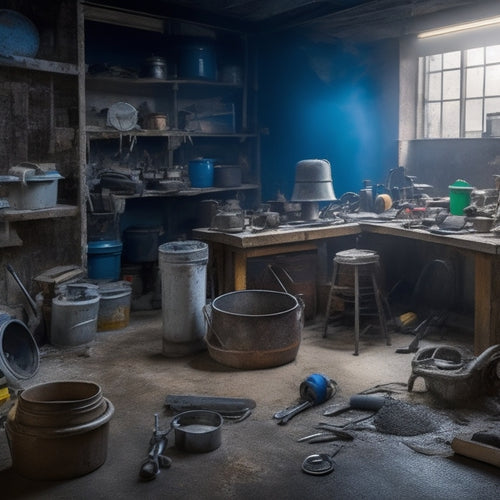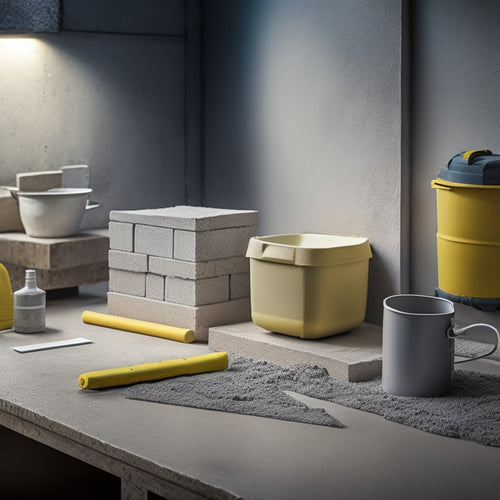
What to Look for in Epoxy Concrete Repair Tools
Share
When selecting epoxy concrete repair tools, you'll want to take into account a range of critical factors to guarantee a successful and long-lasting repair. Start by verifying material compatibility and precise mixing and application processes. Then, evaluate tool durability, ease of cleaning and maintenance, and cost-effectiveness. Don't overlook specialized feature requirements, such as applicator gun options and surface preparation methods. Finally, assess manufacturer support and warranty, including warranty terms and customer service quality. By taking these key factors into account, you'll be well on your way to making an informed decision that meets your repair needs, and exploring these considerations further will reveal even more insights to optimize your tool selection.
Key Takeaways
• Confirm epoxy resin compatibility with concrete substrate and existing coatings to avoid costly rework and structural compromise.
• Accurately control epoxy resin and hardener mix ratio to ensure adequate bonding and strength in the repair.
• Choose durable, high-quality tools with replaceable parts to minimize downtime and reduce maintenance costs.
• Evaluate manufacturer support and warranty, including response times, customer service, and resources, for long-term value.
• Consider specialized feature requirements, such as injection, coating, or patching, to ensure the right tool for the specific repair task.
Material Compatibility Considerations
When selecting epoxy concrete repair tools, you must confirm the materials you're working with are compatible to avoid bonding failures or damage to the surrounding concrete. Incompatible materials can lead to costly rework, delays, and even structural compromise. Consequently, it's crucial to evaluate the material types involved in the repair process.
Verify the epoxy resin is compatible with the concrete substrate, as well as any existing coatings or finishes. You should also assess the surface preparation requirements for each material, as inadequate preparation can compromise the bond between the epoxy and the concrete.
Surface preparation is critical to achieving a strong, durable bond. You'll need to assess the condition of the concrete surface and determine the necessary preparation steps, such as cleaning, grinding, or scarifying. The surface must be free of contaminants, oil, or grease, and any cracks or defects must be properly addressed.
Epoxy Mixing and Application
When you're preparing to apply epoxy concrete repair solutions, you'll need to guarantee accurate mix ratio control to achieve ideal results.
You'll also want to take into account the various applicator gun options available, as they can greatly impact the efficiency and effectiveness of your repair process.
Mix Ratio Control
You must accurately control the mix ratio of epoxy resin and hardener to confirm a successful concrete repair, as even slight deviations can considerably impact the final product's performance and durability.
When it comes to mixing techniques, it's vital to follow the manufacturer's instructions and use the recommended ratio. Ratio accuracy is significant, as an imbalance can lead to inadequate bonding, reduced strength, or even premature failure.
To verify ratio accuracy, use a calibrated mixing cup or scale to measure the resin and hardener accurately. It's also important to mix the components thoroughly, following a consistent pattern to avoid entrapping air bubbles.
Avoid overmixing, which can generate heat, cause the epoxy to cure too quickly, and compromise its performance. Instead, mix in a slow, deliberate manner, scraping the sides and bottom of the mixing container to guarantee a uniform blend.
Applicator Gun Options
With epoxy concrete repair, using an applicator gun can greatly streamline the mixing and application process, allowing for more efficient and precise control over the epoxy flow.
When selecting an applicator gun, you'll need to decide between manual applicators and pneumatic options.
Manual applicators are ideal for small to medium-sized projects, providing a cost-effective solution for low-volume applications. They're typically lightweight, easy to use, and require minimal maintenance. However, they can be tiresome for large projects, as you'll need to manually pump the epoxy mixture through the gun.
Pneumatic options, on the other hand, are better suited for high-volume applications and larger projects. They're powered by compressed air, reducing fatigue and increasing productivity. Pneumatic applicator guns often come with adjustable pressure settings, allowing you to fine-tune the epoxy flow to suit your specific needs.
When choosing a pneumatic option, consider the air pressure requirements, hose length, and gun size to guarantee it meets your project's demands.
Tool Durability and Longevity
Durability and longevity are critical considerations for epoxy concrete repair tools, as they directly impact the efficiency and cost-effectiveness of the repair process. You want to guarantee that your tools can withstand the demands of frequent use and harsh environments.
The tool materials you choose will greatly influence its durability. Look for tools made from high-quality, heavy-duty materials that can resist corrosion and wear. For instance, stainless steel or fiberglass components can provide added strength and resilience.
The repair frequency also plays an important role in determining the tool's durability. If you're working on a large-scale repair project, you'll need tools that can handle high-volume usage. In such cases, it's vital to opt for tools with replaceable parts or those that can be easily serviced.
This will minimize downtime and reduce the overall cost of the repair process. By selecting durable and long-lasting epoxy concrete repair tools, you'll be able to complete projects efficiently, reduce maintenance costs, and extend the lifespan of your tools.
Ease of Cleaning and Maintenance
Epoxy concrete repair tools that are easy to clean and maintain can greatly reduce downtime and extend their lifespan, allowing you to complete projects more efficiently. When evaluating tools, look for features that facilitate easy cleaning, such as smooth surfaces, minimal crevices, and rust-resistant materials. You'll also want to assess the maintenance frequency and cleaning techniques required to keep your tools in good condition.
| Tool Feature | Cleaning Technique | Maintenance Frequency |
|---|---|---|
| Smooth Surfaces | Wipe with solvent | Daily |
| Rust-Resistant Materials | Brush off debris | Weekly |
| Minimal Crevices | Soak in solution | Monthly |
| Detachable Parts | Disassemble and clean | Quarterly |
| Water-Resistant Coatings | Hose down | Annually |
Cost and Value Assessment
You must carefully evaluate the cost and value of epoxy concrete repair tools to confirm they fit within your budget and provide a sufficient return on investment.
When reviewing the cost, consider not only the initial purchase price but also the long-term expenses, such as maintenance and replacement costs. It's important to weigh these costs against the benefits of using the tool, including the quality of the repairs, increased efficiency, and extended lifespan of the concrete structure.
Within your budget constraints, you'll need to prioritize your needs and allocate your resources effectively.
Consider the investment potential of each tool, calculating the potential return on investment based on factors such as reduced downtime, increased productivity, and improved repair quality. By doing so, you'll be able to make informed decisions about which tools to invest in and guarantee a strong return on your investment.
Specialized Feature Requirements
When selecting epoxy concrete repair tools, it's essential to identify the specific tasks and environments the tools will be used in, as this will help determine the specialized feature requirements that are necessary for ideal performance.
You need to take into account the type of repair techniques you'll be using, such as injection, coating, or patching, and the surface preparation methods required, like grinding or sanding. This will help you determine the necessary features, such as drill bits, mixing nozzles, or applicator guns.
For instance, if you're working on a high-traffic area, you may need tools with heavy-duty construction and reinforced materials to withstand the wear and tear.
On the other hand, if you're working on a delicate restoration project, you may require more precision and control over the application process.
Additionally, take into account the environmental factors, such as temperature, humidity, and exposure to chemicals, that may affect the tool's performance and durability.
Manufacturer Support and Warranty
Beyond the tool's features and specifications, its manufacturer's support and warranty can greatly impact the overall value and reliability of the epoxy concrete repair tools. Broad warranties and responsive customer service often distinguish top-tier products from their competitors.
When evaluating a manufacturer's support, you should look for thorough warranty terms that cover repairs, replacements, and refunds. A good warranty should provide clear guidelines on what's covered, for how long, and under what conditions.
You should also assess the manufacturer's customer service, considering factors such as response times, channels of communication, and the knowledgeability of support staff. Look for manufacturers that offer multiple channels of support, such as phone, email, and online chat, and those that provide extensive resources, like FAQs, tutorials, and user manuals.
A manufacturer that stands behind its products with a robust warranty and responsive customer service demonstrates a commitment to your success and satisfaction. By carefully evaluating these factors, you can make an informed decision about which epoxy concrete repair tools are most likely to meet your needs and provide long-term value.
Frequently Asked Questions
Can Epoxy Concrete Repair Tools Be Used for Other Types of Projects?
You're wondering if epoxy concrete repair tools can be used for other types of projects. The answer is yes, they often offer multi-surface applications.
Their tool versatility allows you to tackle a range of tasks beyond just concrete repair.
With the right epoxy product, you can bond materials like metal, wood, or glass.
This flexibility makes epoxy concrete repair tools a valuable addition to your toolkit, expanding their usefulness beyond a single task.
Are There Any Specific Safety Precautions I Should Take When Using These Tools?
When working with epoxy concrete repair tools, you'll want to prioritize your safety above all else.
You'll need to don the right safety gear, including gloves, goggles, and a mask, to protect yourself from harsh chemicals and flying debris.
Additionally, guarantee proper ventilation in your workspace to prevent inhaling harmful fumes.
How Do I Determine the Right Tool Size for My Specific Repair Job?
When determining the right tool size for your specific repair job, you'll want to take into account tool compatibility and the repair techniques you'll be using.
Measure the area that needs repair and choose a tool that can effectively cover it. If you're working with tight spaces, opt for a smaller tool. For larger areas, a bigger tool will save you time.
Ascertain the tool's dimensions match your mixing and application needs to achieve a successful repair.
Can I Use Epoxy Concrete Repair Tools on Freshly Poured Concrete?
When working with freshly poured concrete, you'll need to exercise caution before using epoxy concrete repair tools.
Freshly poured concrete requires time to set and cure, and applying epoxy too soon can hinder the curing process.
Wait until the concrete has reached its initial set, usually within 24-48 hours, before applying epoxy.
This allows the concrete to develop sufficient strength, ensuring a strong bond between the epoxy and concrete.
Are Epoxy Concrete Repair Tools Available for Rent or Lease?
You're not stuck in a tight spot, and renting epoxy concrete repair tools can be a lifeline.
Literally, it's a cost-effective way to get the job done without breaking the bank. Look for rental options that offer flexible lease terms, and crunch the numbers for cost comparisons.
You'll find that renting is often more economical than buying, especially for one-off projects or small-scale repairs.
Research reputable suppliers to find the right tools for your project, and don't hesitate to ask about rental packages.
Conclusion
As you prepare to tackle your epoxy concrete repair project, remember that the right tools can make all the difference.
Will you settle for mediocre results or demand precision and excellence from your tools?
By considering material compatibility, epoxy mixing and application, tool durability, ease of cleaning, cost, specialized features, and manufacturer support, you'll be well-equipped to achieve professional-grade repairs that stand the test of time.
Related Posts
-

7 Tools to Fix Damaged Concrete Floors
You're about to tackle that damaged concrete floor, and the right tools are essential for a successful repair. Start ...
-

Top Concrete Resurfacing Tools for a Pro Finish
When it comes to achieving a professional finish in concrete resurfacing projects, you require the right set of speci...
-

What Tools Do I Need for Concrete Block Laying
You'll need a thorough set of tools to guarantee accurate, efficient, and professional concrete block laying. Essenti...


